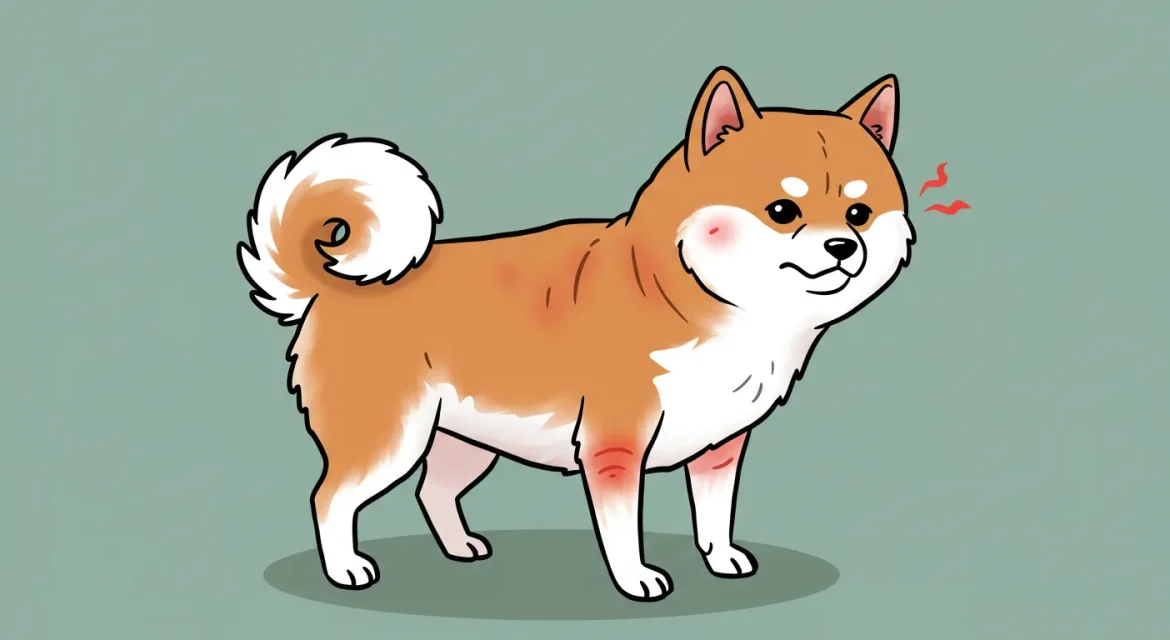Is my Shiba Inu scratching too much? Why are they suddenly limping? Could something be seriously wrong?
If you’ve ever found yourself worrying about your Shiba Inu’s health, you’re definitely not alone. As proud owners of these bold and independent dogs, we know how heartbreaking it can be to see them struggle with hidden issues.
Behind their confident posture and fox-like charm, Shibas can face challenges like allergies, joint pain, and eye problems that often go unnoticed until they worsen.
In this blog, we’ll dive into the most common health concerns affecting Shiba Inus, teaching you what signs to watch for, how to manage these conditions effectively, and how to keep your loyal companion thriving and happy.
Shiba Inu Health Problems and Management
1. Allergies
Shiba Inus are prone to allergies that can cause itching, redness, frequent ear infections, excessive licking, and hair loss. These reactions are often triggered by environmental allergens like pollen or dust, certain foods such as chicken or grains, and flea bites. Proper identification of the allergen is key to effective treatment.
Management Tips:
- Feed limited-ingredient or hypoallergenic diets.
- Use vet-recommended flea/tick prevention.
- Regular bathing with hypoallergenic shampoos.
- Prescription antihistamines or allergy testing if chronic.
2. Hip Dysplasia
Shiba Inus with hip dysplasia may show signs like limping, stiffness, and difficulty rising or climbing stairs. This condition is often caused by genetic predisposition, rapid growth, or being overweight, all of which place extra stress on the hip joints. Early diagnosis and proper management can help reduce pain and improve mobility.
Management Tips:
- Maintain a healthy weight.
- Use orthopedic beds and ramps to reduce joint stress.
- Provide joint supplements (glucosamine, chondroitin).
- Severe cases may require surgery.
3. Patellar Luxation
Patellar luxation in Shiba Inus often presents as skipping steps, temporary limping, or sudden yelps during movement. This condition is usually genetic and commonly affects small to medium-sized breeds like the Shiba. It occurs when the kneecap slips out of place, causing discomfort or instability. Proper care can help manage symptoms and prevent worsening.
Management Tips:
- Keep your dog at a healthy weight.
- Limit high-impact activities.
- Provide joint supplements.
- Massage and controlled exercise can help.
4. Glaucoma
Glaucoma in Shiba Inus is an inherited eye condition that can cause redness, squinting, excessive tearing, and eventual vision loss. If left untreated, it can lead to permanent blindness. Early detection and veterinary care are crucial to managing the condition and preserving your dog’s eyesight.
Management Tips:
- Schedule regular vet checkups, including eye exams.
- Use prescribed eye drops to reduce pressure.
- Monitor for any eye discharge or cloudiness.
- Avoid head trauma or rough play.
5. Progressive Retinal Atrophy (PRA)
PRA is a genetic condition in Shiba Inus that causes the gradual deterioration of retinal cells, starting with night blindness and eventually leading to total vision loss. While there’s no cure, early diagnosis and adjustments at home can help your dog adapt and maintain quality of life.
Management Tips:
- No cure, but vision loss is gradual.
- Maintain a consistent home layout to help navigation.
- Genetic testing recommended before breeding.
6. Atopy
Atopy is a chronic skin condition caused by environmental allergens like pollen, mold, or dust. It leads to itching, rashes, and ear infections. Shiba are genetically predisposed to this issue. It often flares up seasonally.
Management Tips:
- Wipe paws and coat after outdoor walks.
- Use antihistamines or allergy meds prescribed by a vet.
- Regular bathing with medicated shampoos.
- Avoid walks in high-pollen times.
7. Zinc-Responsive Dermatosis
This rare condition leads to scaly skin, hair loss, and crusty patches, especially around the face and paws. It’s due to the dog’s inability to absorb zinc properly. Shibas may show symptoms even with a good diet. Supplementing zinc usually resolves the issue.
Management Tips:
- Supplement with vet-approved zinc.
- Avoid foods that block zinc absorption (like high-calcium foods).
- Maintain a balanced, high-quality diet.
- Monitor skin condition regularly.
8. Periodontal Disease
Shiba Inus are prone to dental issues due to tartar buildup. This leads to gum disease, tooth loss, and pain while eating. Bacteria can even spread to the heart and kidneys if untreated. Prevention is key, as dogs often hide dental pain.
Management Tips:
- Brush your dog’s teeth daily.
- Use dental treats and toys.
- Schedule yearly professional cleanings.
- Feed dry kibble instead of wet food.
9. Epilepsy
Epilepsy causes recurring seizures, which can be mild or severe. Triggers may include stress, excitement, or unknown factors. While not usually life-threatening, seizures are frightening and must be managed. Shibas can have idiopathic epilepsy.
Management Tips:
- Record and report seizure frequency to the vet.
- Administer anti-seizure medications regularly.
- Reduce stress and avoid known triggers.
- Do not leave the dog unattended near water or stairs.
10. Hypothyroidism
This is caused by low thyroid hormone production. It leads to weight gain, hair loss, lethargy, and skin issues. Shiba Inus with this condition may seem more tired or mentally dull. It’s typically diagnosed through blood tests.
Management Tips:
- Daily thyroid medication .
- Regular blood monitoring and dose adjustment.
- Balanced diet to manage weight.
- Regular exercise to boost energy.
Conclusion
Shiba Inus are bold, beautiful, and intelligent dogs, but like all breeds, they come with their own set of health challenges. From allergies and joint issues to eye conditions and dental disease, staying informed and proactive is key to ensuring your Shiba Inu lives a long, healthy, and happy life. Regular veterinary check-ups, a nutritious diet, proper grooming, and daily mental and physical stimulation go a long way in preventing or managing most common health issues. By understanding their needs and being attentive to early symptoms, you not only safeguard their well-being but also strengthen the loving bond you share with your Shiba Inu.




